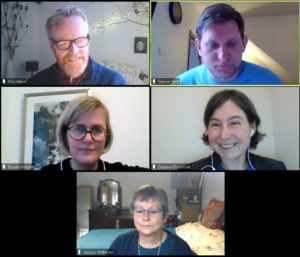Globally Challenged: the Future of ODA Funding
 Official Development Assistance (ODA) funding has allowed our research to have an impact beyond academia, and beyond the UK.
Official Development Assistance (ODA) funding has allowed our research to have an impact beyond academia, and beyond the UK.
It has enabled us to think globally, and to work for the benefit of the global community, particularly in overcoming deep-seated socio-economic problems and developmental challenges.
However, will a shift in government policy lead to these achievements being undermined or reversed?
On 3 December 2020 Eastern Arc hosted a webinar to explore the future of ODA funding following the government’s spending review and R&D Roadmap.
Recording and slides from the event

Clockwise from top left: Phil Ward (EARC), Simon Hall (Wellcome), Dajana Dzanovic (UUKi), Jacqui Williams (UKRI), and Beate Knight (University of Essex)
A recording of the event is available here (Zoom).
Slides from the event are available below:
- Introduction (Google Slides)
- Phil Ward, Director, Eastern Arc
- UUKi’s report on the impact of ODA funding (ppt)
- Dajana Dzanovic, Head of Strategic Partnerships, UUKi
- ODA Funding in UKRI (ppt)
- Jacqui Williams,Head of Partnerships and Programmes, International, UKRI
- Wellcome’s report on the UK’s role in global research (ppt)
- Simon Hall, Senior Policy and Advocacy Officer, Wellcome Trust
Eastern Arc’s position on the future of ODA funding
In addition, our position paper on the importance of ODA funding is available here.
Briefly, the paper explains how our history of socially aware, radical and disruptive research, rooted in a region that is outward-looking and open, has meant that we have always understood the importance of a global perspective.
ODA funds (particularly through GCRF QR funding) have been crucial in furthering our ambitions globally, and have helped realise our vision of working in partnership with colleagues in DAC list countries for their social and economic development. It has meant that we – and UK research more broadly – can provide leadership and share the benefits of excellent research.
It is imperative that the case for ODA funding continues to be made to the government, using agendas such as the SDGs. Responding to the broader global context and drivers was imperative for us in justifying our four themes. As the UK leaves the EU, we need to make the case that we are part of a wider conversation, and that the challenges we face globally need to be met with collaborative responses.
Such funding will be a key enabler of Eastern Arc’s ambition ‘to deliver real and tangible change through a close collaboration to address pressing issues of sustainable development,’ and without it our work will be that much more difficult.
We will, of course, continue to support and develop our excellent research, but it will inevitably be the case that fewer colleagues will be encouraged to look to projects with global impact, and will instead turn to UK-focused efforts. This would be a loss for vital global research, but also for UK leadership and, on both an institutional and individual level, a significant reduction of opportunity.
Top Photo by Annie Spratt on Unsplash
